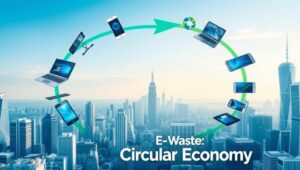The Environmental Impact of Computing: E-Waste and Energy (2025 Concerns)
The Environmental Impact of Computing: E-Waste and Energy (2025 Concerns) Computing has become an indispensable part of modern life, permeating nearly every aspect of society. However, the proliferation of computers, smartphones, and other electronic devices has led to growing environmental concerns, primarily related to electronic waste (e-waste) and energy consumption. E-Waste: A Mounting Problem E-waste refers to discarded electronic devices that have reached the end of their useful life. According to the United Nations, the world generated 53.6 million metric tons of e-waste in 2019, a figure that is projected to reach 74 million metric tons by 2030. This rapid






